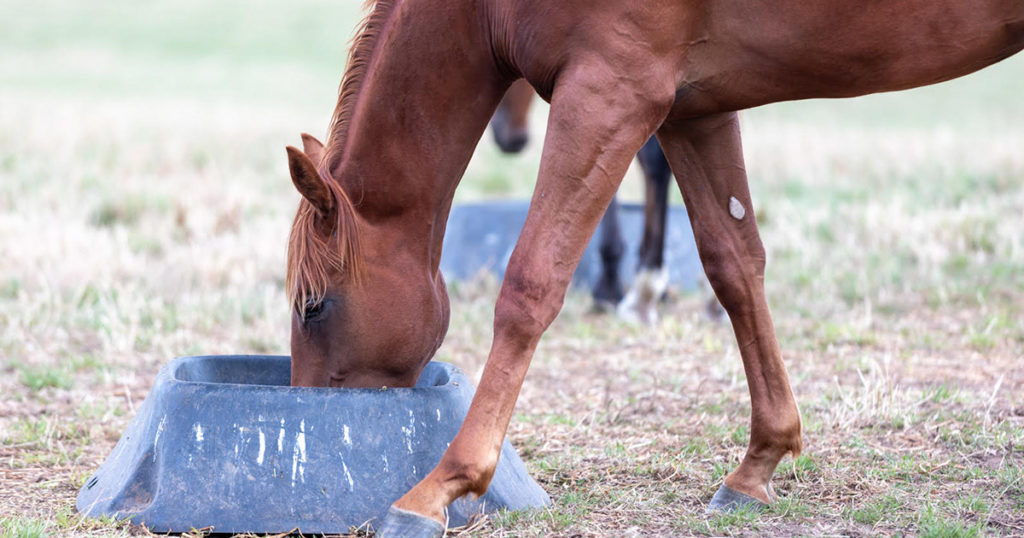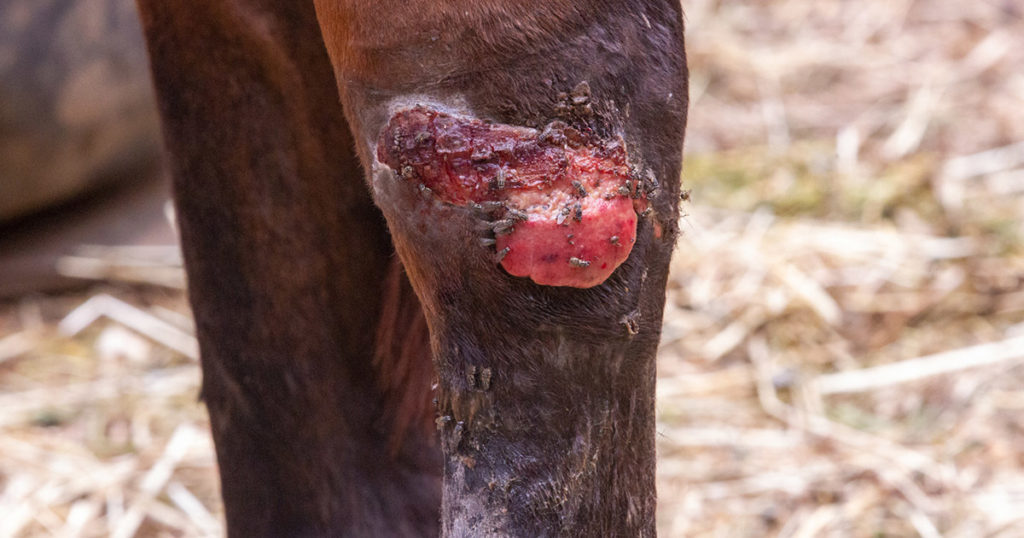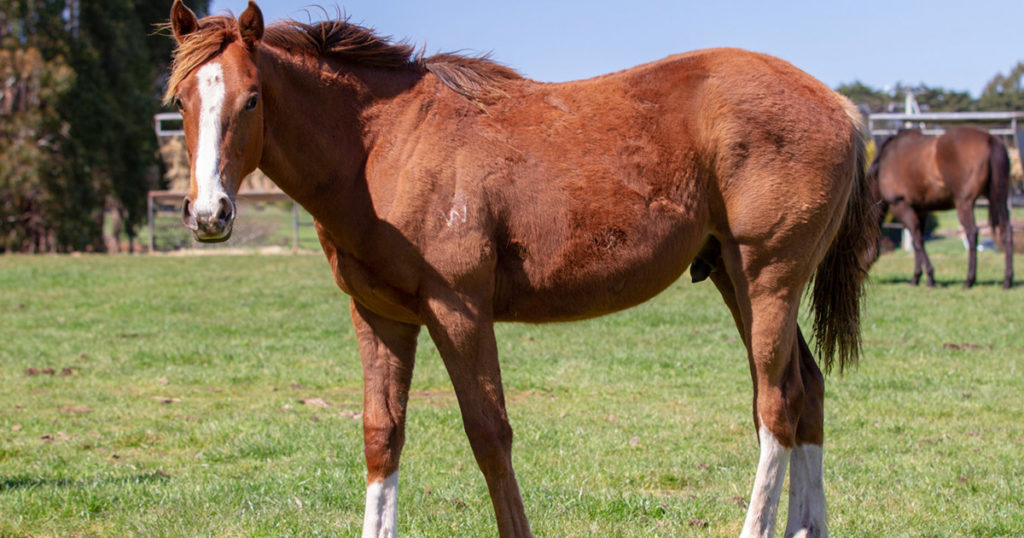Protein- it’s a most crucial component of a horse’s diet, yet is commonly blamed for causing a whole host of problems in horses: Everything from ‘hot behaviour’, to joint problems, swollen legs, liver and kidney issues. Yet are these issues actually caused by protein? And what happens when we don’t feed our horses enough quality protein?
What is Protein?
Protein is a crucial macronutrient in a horse’s diet and is comprised of long chains of building blocks called amino acids. There are 21 amino acids. The specific order and combination of amino acids determines the structure and function of each protein. Insufficient dietary intake of specific amino acids limits the production of key proteins essential in our horse’s bodies. For more in-depth information on protein quality see the article: Soy: The Good, Bad and Confusing.
Protein is Needed for Growth, Maintenance and Repair of Tissue
We commonly only think of this as important when we are trying to increase muscle mass in a horse. For instance, building top-line on our ridden horse, or conditioning a thoroughbred yearling for sale. Yet protein is absolutely essential for normal growth and development of the young horse, and recovery from riding and training in active horses. Insufficient protein in the diet can therefore increase risk of illness and injury in our horses. Times of illness and injury also increase protein requirements in order to help recover from the illness or heal from the injury. Providing insufficient protein to a sick or injured horse during their recovery can significantly delay and/or impair their healing and adversely impact their future athletic potential.
Protein Facilitates Biochemical Reactions
Enzymes are a specific type of protein that aid in the normal biochemical reactions that take place in a horse. Specific enzymes are needed to facilitate proper digestion (therefore helping to promote optimal gut health and utilisation of feed); energy production (helping a horse to perform); normal metabolism (helping to regulate weight and temperature in a horse); blood clotting; and muscle contraction. Insufficient protein in the diet can lead to digestive problems- a critical consideration given the heightened focus on gastrointestinal (GI) health. A common mistake is to restrict protein intake in the overweight horse: this can further slow metabolism (compounding the problem) and compromise overall health.
Protein is Required for Proper Communication in the Body
Hormones are chemical messengers that aid in communication between a horse’s cells, tissues and organs. They are needed for everything from normal growth, metabolism, reproductive function and digestion. Amino acids are also an important component of neurotransmitters: the chemical messengers which play a crucial role in a horse’s mood, temperament, learning and behaviour.
Protein Provides Structure
Different types of protein are essential for the formation of healthy bones, tendons, ligaments, muscles, skin and hooves. Depending on the type of protein, they aid in providing structure, strength, elasticity and rigidity to specific tissues. Insufficient protein in the diet can make a horse more susceptible to injury to muscles, tendons, bones and ligaments. They may also have poor skin and/or hoof quality.
Protein Helps to Maintain pH Balance in the Body
Proteins act as a buffer system, helping a horse’s body to maintain proper pH values of the blood and other bodily fluids.
Protein Helps to Balance Body Fluid Levels
Albumin and globulin are two important proteins found in a horse’s blood. They help to maintain the body’s fluid balance by attracting and retaining water. If a horse’s diet has consistently has low quantities of quality protein, the levels of albumin and globulin eventually decrease. This can result in swelling or oedema as these proteins can no longer keep blood in the blood vessels, forcing the fluid into the spaces between cells. The irony is that protein is often blamed for causing swelling in horses- with the reverse often being the cause!
Protein is Needed for a Healthy Immune System
Protein is absolutely essential for white blood cell production and the formation of immunoglobulins (antibodies) needed to fight infection in our horses. Insufficient protein in the diet can leave a horse more susceptible to bacterial, viral and fungal infections.
Protein Aids in the Transportation and Storage of Nutrients
Transport proteins carry substances in our horse’s blood streams- into, out of and within cells. The substances transported by these proteins include nutrients such as vitamins and minerals, blood sugar, cholesterol and oxygen. Whilst we often think of iron as being a key driver in helping oxygen delivery to the body’s tissues, protein plays a paramount role- yet is often overlooked. Specific proteins also have a storage role: ferritin is a storage protein that stores iron.
Problems with Excessive Protein: Myths or Facts?
So now we can see that protein is absolutely vital in keeping our horses healthy, yet is there a downside to this nutrient? And can we feed too much? Like most things, the answer is relative to the situation and the individual horse.
Excess Protein
To overly simplify, horses are unable to store excess protein that they consume in their diet for later use. The metabolism of excess protein increases levels of nitrogen end-products, such as ammonia and urea. A diet containing excess protein will increase the horse’s water requirements and urine output as the ammonia and urea are flushed out of the body. If a horse is kept out at pasture, is only in light work and has free access to plenty of fresh water, this generally isn’t a problem. It is an issue however where horses are stabled. Exposure to this strong urine can cause lung irritation and other respiratory problems. Extra urination means extra wet bedding, which equates to more mucking out.
Metabolism of Protein Produces Heat
Protein digestion and metabolism is a heat generating process. A horse that is on a high protein diet that is burning a lot of protein as an energy source will sweat more to help get rid of the heat. It is important to remember that the body has a preference for using carbohydrates and fats over protein as an energy source, and will only use protein as a significant energy source when these other two nutrients don’t meet their requirements. Protein fed in appropriate amounts to meet a horse’s needs will not contribute greatly to heat production or sweating. Feeding excessive amounts of protein however, particularly to horses in hot and humid climates, or those undertaking moderate to heavy work, can contribute to dehydration and heat stress.
Protein Causes Poor Behaviour/ Hot Horses: MYTH
Protein is often blamed for making horses ‘hot’, nervy or spooky. This is turn can cause some owners to avoid including quality sources of protein in their horse’s diet. Protein has not been shown to cause behavioural issues in horses. Diets which are high in energy and excessive to a horse’s energy needs which are also high in protein can contribute to a horse being hyperactive or silly. The problem here is the overall energy intake, not the protein!
Kidney and/or Liver Damage: MYTH
In healthy horses, high protein diets have not been demonstrated to cause kidney and/or liver damage. In horses that have pre-existing liver or kidney problems, then protein intake may need to be restricted- ensuring that intake is still sufficient to meet a horse’s daily requirements but does not exceed them.
Take Home Message
As a general rule, I see far more horses in clinical practice with insufficient protein intakes compared to those with excessive protein intakes. Insufficient protein in the diet may leave a horse more susceptible to illness and/or injury and delay or impair their recovery. Including adequate, quality protein in the diets of our horses is absolutely essential in order for them to be healthy, perform and recover at their best.

Camilla Whishaw is a highly regarded, experienced horsewoman and naturopath, helping to holistically treat and manage a broad range of equine health conditions and injuries, with a passion for mare and stallion fertility.
As a world-renowned practitioner, presenter, author, and consultant in the field of Equine Naturopathy, Camilla shares her knowledge through keynote presentations, interviews, lectures, panel sessions, and workshop training.





